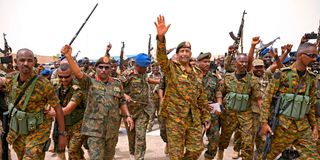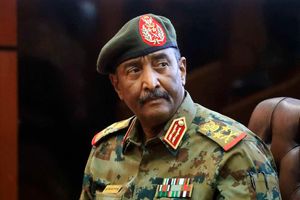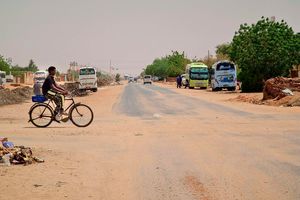
Sudanese army chief Abdel Fattah al-Burhan visits the Flamingo Marine Base in Port Sudan on August 28, 2023.
Mediators trying to end the conflict in Sudan are ending the year with a bitter taste in their mouths, learning the harsh realities of warring factions who want power by any means necessary.
It is a harsh lesson learned in the past eight months since the Rapid Support Forces (RSF) launched a war against Sudan Armed Forces (SAF) in Khartoum.
As of this week, the United Nations estimates that at least 9,000 people have died in the war, more than 5.6 million have been internally displaced and another million have become refugees in neighbouring Chad, South Sudan, Ethiopia and Egypt.
So why can't the warring factions choose the peace they claim to seek? Sources have told the Nation that Sudan's power struggle, which initially led to the outbreak of war, is now only one of the reasons. The other reason? A contest between old and new guards who want to move on from the regime of Omar al-Bashir, who was ousted in 2019.
On December 9, Sudanese junta leader Abdel Fattah al-Burhan gathered leaders under the Intergovernmental Authority on Development (Igad) in an attempt to revive regional mediation to end the conflict.
Outsiders saw this as a chance to at least achieve a ceasefire, while giving Burhan the legitimacy to relaunch the transitional government. But after the communique said SAF and RSF leaders had agreed to meet face-to-face, Khartoum rejected the content of the dispatch and accused Igad of falsifying the meeting outcomes.
“It was shocking, given that Sudan prevailed on Igad leaders to meet,” said a diplomat familiar with the matters at the regional bloc headquartered in Djibouti. During the Summit, Sudanese junta leader Abdel Fattah al-Burhan agreed to dialogue with his nemeses in the RSF as long as they withdraw from Khartoum and civilian areas they have occupied.
After the release of the dispatch, Sudan singled out Kenya, accusing it of inserting the section on the agreed meetings. Kenya has not responded to the accusations.
But sources in Djibouti said Sudan did not object to the draft communique, which was circulated for approval before publication, because there was no accredited Sudanese diplomat in the room.
“The Minister (Ali al-Sadiq) left with the President (Burhan). The remaining officials were inexperienced and weren’t even accredited to make changes to the document,” a source said of the December 9 meeting.
Sudan's Ministry of Foreign Affairs is also seen as problematic, with senior officials at odds with Burhan's stance and more aligned with the remnants of Bashir-era political and military leaders. As such, they have formed a pattern of rejecting any regional overtures for peace in Sudan, prolonging the war, sources say.
The Igad meeting created a new team of diplomats to spearhead mediation in Sudan. This team was seen as a rejection of the previous quartet of countries in Igad, which Sudan had already rejected after an Igad summit in June named Kenya, Ethiopia, South Sudan and Djibouti. However, the team has not yet been formally unveiled, a problem that stems from Khartoum's protests against the December 9 communique.
The difficulty of resolving the conflict in Sudan is due to several factors, including the long history of conflict in the country and the complexity of political ideology, including ethnic and religious issues and unequal distribution of resources.
However, while the cause of the April 15 war was said to be a disagreement over the future of the transition, the parties now see the war as a means to dominate the political arena, fuelling the war. The RSF calls the SAF a criminal militia, while the SAF calls the RSF rebels.
Prior to the Igad summit, Burhan had engaged in shuttle diplomacy in the region and beyond to establish himself as the country's legitimate leader. But his junta is suspended from the African Union after a coup in October 2021. As such, Sudan has no vote and cannot attend key meetings of the continental body. Khartoum has responded with indifference to continental efforts to end the war.
This failure of regional and international mechanisms may have caused confusion. But it has provided an advantage to Bashir-era leaders seeking a return. On the ground, civilians are caught between a rock and a hard place: Support the RSF? It has been brutal, carrying out rapes, killings and looting. The SAF? They have not been able to hold on to certain areas, which means they cannot protect civilians.
“What is frustrating for us is that the leadership of Gen Burhan doesn’t seem to communicate as one, even within the SAF," said one diplomat.
“As such, we have tried to develop a roadmap but then a problem emerges immediately Sudan disowns the suggestion as an imposition.”
The contradictions after the Igad meetings may be a failure of leadership. But it could also be a tactic to ensure that these proposals don't work at all.
There is a constant threat that the current violence will turn into civil war, with dire humanitarian and political consequences.
The Rapid Support Forces took control of areas in Khartoum and made significant progress in the Darfur region (west). Last week they moved into the neighbouring state of al-Jezira, which they took over in a matter of days. On the other hand, members of the government and army leaders have holed up in the city of Port Sudan, overlooking the Red Sea in the east of the country.
Al-Burhan has maintained his position as de facto head of state in international forums, attending United Nations and Arab League meetings. But RSF's Mohamed Hamdan Daglo (Hemedti), whose businesses have been heavily sanctioned by the West, continues to rely on the United Arab Emirates (UAE) for arms supplies, according to various sources. The Igad communiqué did not name the UAE, but called on outside parties to stop interfering in the supply of arms. Burhan later protested that the statement should have targeted only RSF and the UAE.
The expansion of the RSF in Darfur has brought local Arab militias into its fold. The armed Arab groups, known as the Janjaweed, form the backbone of the RSF. In the early part of this century, under the leadership of Daglo, they carried out a scorched-earth policy in Darfur on behalf of former president Omar al-Bashir, burning and looting the property of non-Arab ethnic groups and raping women. This violence led to al-Bashir being indicted by the International Criminal Court (ICC). He has never been tried.
Despite the advance of the Rapid Support Forces in Darfur, the chances of either side achieving a decisive military victory over the other appear slim. Even if the army is able to regain control of Khartoum, a difficult task at the moment, it will face logistical challenges fighting in distant Darfur.
As part of the US-Saudi mediation, known as the Jeddah process, and accompanied by an American threat to impose sanctions on individuals responsible for threatening security and stability in Sudan, the army and the RSF accepted negotiations in the Saudi city of Jeddah. The negotiations initially ended after a month, with mediators accusing the parties of lacking seriousness.
On June 1, 2023, the US imposed sanctions on both the army and the RSF, with the aim of holding those responsible to account.
Talks have since resumed, but the parties have refused to honour ceasefire commitments.








